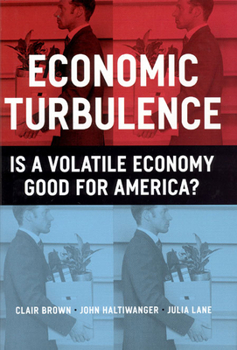Economic Turbulence: Is a Volatile Economy Good for America?
Every day, in every sector of our economy, a business shuts down while another starts up, jobs are created while others are cut, and workers are hired while others are laid off. This constant flux, or turbulence, is a defining characteristic of our free market system, yet it mostly inspires angst about unemployment, loss of earnings, and the overall competitiveness of corporations. But is this endless cycle of fluctuation really so bad for America? Might something positive be going on in the economy as a result of it? In this penetrating work, three esteemed economists seek to answer these questions by exploring the real impact of volatility on American workers and businesses alike. According to the authors, while any number of events--shifts in consumer demand, changes in technology, mergers and acquisitions, or increased competition--can contribute to economic turbulence, our economy as a whole is, by and large, stronger for it, because these processes of creation and destruction make it more flexible and adaptable. The authors also acknowledge and document the adverse consequences of this turbulence on different groups of workers and firms and discuss the resulting policy challenges. Basing their argument on an up-close look into the dealings and practices of five key industries--financial services, retail food services, trucking, semiconductors, and software--the authors demonstrate the positive effects of turbulence on career paths, employee earnings, and firm performance. The first substantial attempt to disentangle and make clear the complexities of this phenomenon in the United States, Economic Turbulence will be viewed as a major achievement and the centerpiece of any discussion on the subject for years to come.
Format:Hardcover
Language:English
ISBN:0226076326
ISBN13:9780226076324
Release Date:October 2006
Publisher:University of Chicago Press
Length:212 Pages
Weight:1.00 lbs.
Dimensions:0.9" x 6.3" x 9.2"
Customer Reviews
1 rating
Journalists and Jobs: A Peek Under the Surface
Published by Thriftbooks.com User , 18 years ago
Because the popular press focuses almost exclusively on net job creation or loss, they fail to paint a meaningful picture of how the U.S. economy really works underneath the surface. For every new job that journalists report in the economic section of your local newspaper, it typically means that 5 jobs were created and 4 were lost. And yet, churn of this sort is the sign of a healthy, vibrant economy. Thus, the effort to try to preserve jobs only leads to stagnation. Greater job loss will occur over the long run as competitors (both foreign and domestic) gain advantage precisely because they can both create and destroy jobs in response to market conditions. The authors of Economic Turbulence should be applauded for telling this story that too many people still don't want to hear.





